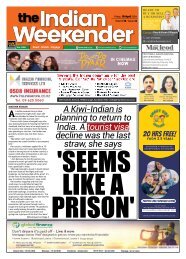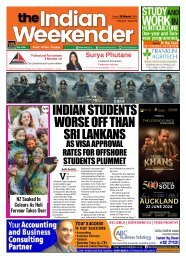The Indian Weekender, 07 May 2021
Weekly Kiwi-Indian publication printed and distributed free every Friday in Auckland, New Zealand
Weekly Kiwi-Indian publication printed and distributed free every Friday in Auckland, New Zealand
Create successful ePaper yourself
Turn your PDF publications into a flip-book with our unique Google optimized e-Paper software.
<strong>The</strong> <strong>Indian</strong> <strong>Weekender</strong> Friday, <strong>May</strong> 7, <strong>2021</strong><br />
FEATURES 19<br />
TRAVEL TO INDIA DURING COVID-19:<br />
What you need to know before you go<br />
If you’re planning to travel to India, here’s<br />
what you’ll need to know and expect if<br />
you want to visit during the coronavirus<br />
pandemic.<br />
<strong>The</strong> basics<br />
India is currently the global center of a<br />
devastating new wave of the pandemic, with<br />
the country’s health system close to collapse.<br />
<strong>The</strong> country swiftly closed its borders at the<br />
start of the pandemic, banning all scheduled<br />
international flights in March 2020.<br />
Tourists are still banned, though those<br />
traveling on other visas from the continents<br />
of Europe, Africa and South America are<br />
now allowed, along with travelers from other<br />
destinations who meet strict criteria.<br />
Current flight bans<br />
Due to the second wave of infections, many<br />
places are massively reducing, indefinitely<br />
suspending or banning travel to and from India.<br />
At present, those destinations include Australia,<br />
Canada, China (including Hong Kong),<br />
Germany, Italy, New Zealand, Saudi Arabia,<br />
the UAE, the United Kingdom (which added<br />
India to its “red list”) and the United States.<br />
<strong>The</strong> U.S. State Department alert reads in part,<br />
“If you must travel to India, get fully vaccinated<br />
before travel. All travelers should wear a mask,<br />
stay six feet from others, avoid crowds, and<br />
wash their hands.”<br />
A planned travel bubble with Sri<br />
Lanka has been postponed.<br />
What’s on offer<br />
<strong>The</strong> question is: What isn’t on offer in India?<br />
This vast country has an astonishing range of<br />
landscapes, architecture, cultures and religions.<br />
Most first-timers stick to the “golden triangle”<br />
of Delhi, Agra and Jaipur, but other big hitters<br />
for newbies include the Kerala waterways,<br />
beaches of Goa and Mumbai, one of the world’s<br />
most thrilling cities.<br />
Who can go<br />
Tourists are not yet permitted. Only <strong>Indian</strong><br />
nationals, those moving to the country as<br />
residents, and those from certain countries who<br />
qualify for visas other than tourist visas may<br />
go. From the United States, United Kingdom<br />
and Canada, things are more restricted -- only<br />
diplomats and those listed in a government<br />
memorandum may travel. However other visa<br />
holders from the European Union, Africa and<br />
South America may travel -- as long as it is not<br />
on a tourist visa.<br />
What are the restrictions?<br />
All arrivals are screened. Anyone showing<br />
symptoms will be taken to a medical facility.<br />
Land borders are closed, other than for<br />
returning India nationals. As of February 22, all<br />
travellers must upload a self-declaration form<br />
on the Air Suvidha Portal, as well as a negative<br />
PCR test taken within 72 hours of the journey.<br />
<strong>The</strong>y must also declare via the portal that they<br />
will quarantine at home for 14 days on arrival.<br />
Travellers arriving from the UK or Middle<br />
East must fill in the same form, declaring their<br />
travel history of the past 14 days, and any<br />
connecting flights on arrival in India, as well<br />
as provide a negative PCR test. <strong>The</strong>y will be<br />
segregated in-flight or while disembarking and<br />
must undergo a further PCR test on arrival at<br />
their own expense. <strong>The</strong>y must stay at the airport<br />
until they get their results. Transit passengers<br />
coming from these countries who test negative<br />
can catch their connecting flights, but must<br />
quarantine at home for seven days, and take a<br />
test at the end of the quarantine period.<br />
What’s the Covid situation?<br />
India has seen over 18.3 million cases and<br />
nearly 205,000 deaths as of April 29, overtaking<br />
Brazil as the country with the world’s second<br />
highest case numbers, after the United States.<br />
Health services are close to collapse.<br />
<strong>The</strong> outbreak has pushed the country’s<br />
healthcare system to near breaking point. With<br />
no space left in hospitals, patients are being<br />
left to die at home, in ambulances and outside<br />
clinics. Even those who are given a bed remain<br />
in danger, with hospitals running out of oxygen<br />
and asking patients’ families to bring their own.<br />
On the first anniversary of its initial<br />
lockdown, India recorded 50,000 new cases -- a<br />
record since November. India reported 295,041<br />
cases of coronavirus and 2,023 deaths on April<br />
21, its highest rise in cases and highest death<br />
increase recorded in a single day since the<br />
beginning of the pandemic, according to a the<br />
<strong>Indian</strong> Ministry of Health.<br />
By April 28, that figure was 379,308 new<br />
cases, and 3,645 deaths -- another record. India<br />
is now registering over a million new cases<br />
every three days. It follows what experts say<br />
was a relaxing of behavior in early March, after<br />
the federal health minister declared that India<br />
was “in the endgame” of the pandemic.<br />
What can visitors expect?<br />
India imposed one of the world’s strictest<br />
lockdowns in March 2020, though restrictions<br />
have been eased as the months have gone on.<br />
Weddings and religious events are now allowed<br />
to take place, and domestic travel is allowed.<br />
However, different states are imposing different<br />
regulations. Maharashtra -- where Mumbai is<br />
located -- imposed an evening curfew on 28<br />
March. Non-essential shops are now closed in<br />
Maharashtra, and grocery stores are only open<br />
from 7 a.m. to 11 a.m. Gatherings of more than<br />
five people are banned.<br />
Prime Minister Narendra Modi, who has<br />
been holding political rallies across the<br />
country, addressed the nation on April 20. He<br />
appealed to states to “use a lockdown as their<br />
last option,” even as the capital New Delhi<br />
entered its first full day lockdown.<br />
<strong>The</strong> Kumbh Mela, an important Hindu festival<br />
and one of the biggest pilgrimages on Earth,<br />
has gone ahead throughout April. Millions of<br />
<strong>Indian</strong>s have traveled from across the country<br />
to Haridwar, an ancient city in Uttarakhand<br />
state, to attend ceremonies and prayers and<br />
take sacred dips in the Ganges River. Visitors<br />
must register online and test negative before<br />
bathing, but experts have warned it “could go<br />
down as one of the largest mass super spreading<br />
events ever.”


















